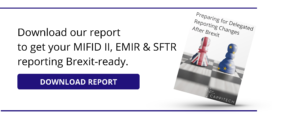
Are you a Small Financial Counterparty under EMIR Refit? And what does it mean if you are?
One of the less trumpeted changes to be introduced by the EMIR Refit, adopted last year, was the creation of a new category of entity, the Small Financial Counterparty.
Just as Non-Financials are split between those which exceed the clearing threshold for OTC transactions and those which don’t, so Financial firms are now subject to a similar distinction.
The change was introduced to reduce some of the overhead (of the clearing obligation) for smaller financial firms, who are however still expected to observe risk mitigation standards such as the posting of margin.
For most firms the only practical ramification will be the requirement to notify both their local NCA and ESMA if they perform their threshold calculation and find that they exceed it for any asset class. They may also choose not to perform the calculation, in which case they will still be required to notify the regulators of this fact, and will be subject to the clearing obligation four months later.
The first calculation period ended in mid-June of 2020, and if at this stage you have not performed the calculation, or have not notified the regulators, be aware that you will be assumed to be a Small Financial Counterparty. If you suspect that this is not the case, it would be advisable to run the calculation and check your status. For UK firms, guidance on calculating the average exposure per asset class may be found at this link, which also advises on notification via the Connect system.
The form for ESMA submission, and workbook with instructions, may be found here.
The dual notification requirement (to ESMA and NCAs), as well as this applying to those who exceed the threshold and those who choose not to calculate, is stated in answer to OTC question 2 from the latest EMIR Q&A.
On the day of entry into force of Refit, FCs and NFCs who exceed the clearing thresholds (being referred to as FCs+ and NFCs+) or who choose not to calculate their positions (also considered and referred to as FCs+ and NFCs+), as per Article 4a(1)(a) and Article 10(1)(a), will have to notify ESMA and the relevant NCAs.
See full Q&A text here.
Contact us to learn more about how we are helping over 200 financial institutions fulfil their reporting obligations.







